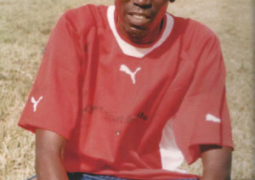The Special Criminal Court yesterday convicted and sentenced former Secretary General Dr Njogu Bah, former Attorney General Lamin Jobarteh and former Solicitor General Pa Harry Jammeh to a mandatory jail term of two years.
Presiding judge Justice Emmanuel Nkea found the three former senior government officials guilty on charges of conspiracy to carry out a lawful purpose by an unlawful means and abuse of office.
Delivering his judgment in a packed courtroom, Justice Emmanuel Nkea said that upon information dated and filed on the 19th August 2013, the convicts were jointly indicted on three counts of conspiracy, giving false information and abuse of office.
He told the court that all the accused persons each denied the charges on the 19th August 2013, and the trial effectively commenced against them on the 20th August 2013, after a consent to prosecute dated and filed on the 19th August 2013 was issued by the Attorney General.
The state, the judge said, adduced in evidence the testimonies of five witnesses and tendered a host of exhibits in support of the indictment, while the accused persons each gave sworn evidence in their defense and tendered a host of exhibits as well.
According to the trial judge, the facts of the case are simple and straight forward:
‘‘On the 17th January 2013, the 3rd accused Dr Njogu L Bah issued a letter (Exhibit E), directing the Inspector General of the Police to arrest and investigate Justice Joseph Wowo. On the same date, the Judicial Secretary issued a letter (Exhibit D2), terminating the appointment of Justice Joseph Wowo as President of The Gambia Court of Appeal. Justice Wowo was later arrested, investigated and charged before the Banjul Magistrates’ Court on seven counts of giving false information. The charges were later dropped at the instance of the 1st accused and Justice Wowo left the country,’’ he stated.
The trial judge told the court that prior to his arrest, Justice Joseph Wowo had written a complaint to the National Intelligence Agency and, on the strength of his complaint, Mrs Amie Bensouda, Mr Buba Jawo, Mrs Mariama Ceesay, and other staffs of the Judiciary were arrested, and the false information charge were based on the content of Justice Wowo’s complaint.
‘‘Instructions were later conveyed to the police by the Solicitor General for Mrs Bensouda to be absolved of any wrong-doing, and for prosecution of Justice Wowo. The 1st accused, Justice Lamin Jobarteh would later issue a Nolle Prosequi on the 12th day of February, and on that same day, prosecution was discontinued against Mr Justice Joseph Wowo,’’ he narrated.
The judge pointed out that there was a meeting between Mr Justice Wowo, and his friends lawyers Uzoma and Chime on the one hand and Justice Jobarteh and Mr Pa Harry Jammeh on the other hand and, after that meeting, Justice Wowo agreed to, and eventually left The Gambia, while the accused persons were subsequently arrested and charged and they volunteered statements to the police.
He said on the evidence before him, the 1st and 2nd accused persons have relied heavily on exhibit E, the letter issued by the 3rd accused, as the basis of their action.
‘‘They argued that by virtue of their respective positions, they could not disobey executive directives contained therein. The 3rd accused person has also intimated in his cautionary statement to the police that the instructions contained in exhibit E for the removal, arrest, and prosecution of Justice Wowo were indeed executive directives from His Excellency the President of the Republic of The Gambia,’’ he said, adding that where appropriate, His Excellency the President of the Republic can cause the removal of a judge from office.
Justice Nkea further stated in his judgment that the whole matter depends on the propriety or otherwise of the letter (Exhibit E) written by the 3rd accused, which is to say, if there is evidence that his Excellency the President actually directed the removal of Justice Wowo, then there is no case, otherwise the accused persons need to answer for it. ‘‘So the question then is, did the 3rd accused receive proper directives on the arrest and investigation of Justice Wowo? ‘’
Now, he went on, it is trite that the burden to prove a charge against an accused person rest on the prosecution and that this burden does not shift in a criminal trial except as otherwise provided by statute. He noted that the prosecution must proof each of the above elements beyond a reasonable doubt.
‘‘But on the evidence before the court, there is no evidence of official record of such directives and the 3rd accused admitted so in his evidence before the court. This is reinforced by Exhibit G. So there is no evidence upon which I can reach the conclusion that there were proper official directives for the arrest and investigation of Justice Wowo. And because there is no such convincing evidence before this court, the conclusion I reach is that there was no such directives and this I shall as fact. Therefore, the directives issued by the 3rd accused were improper,’’ he ruled.
He noted further that to prove the offence of Giving False Information to a Public Servant under Section 144 (a) of the Criminal Code, the prosecution must establish that (a) the accused person(s) knowingly gave information to a public servant; (b) the accused person(s) knew or had reasons to believe that the information was false; (c) the accused(s) gave the false information with the intention to cause the public servant to do or omit to do anything which would otherwise not have been the case if the true facts were known; and (d) the public servant actually acted or omitted to act as desired.
‘‘So in this case, it must be established that: (a) the Judicial Secretary Mr John Belford is a public servant; (b) the accused person(s) knowingly gave information to Mr John Belford in his capacity as the Judicial Secretary; (c) the accused person(s) knew or had reasons to believe that the information was false; (d) the accused person(s) gave the false information with the intention to cause the judicial Secretary to cause the termination of the appointment of Justice Joseph Wowo as President of The Gambia Court of Appeal, which act he would otherwise not have done if he knew the true facts,’’ he stated.
In passing his sentence, Justice Nkea said he had carefully listened to the very touching plea for leniency moved by the respective counsel on behalf of the convicts. ‘‘I have carefully considered the circumstances surrounding this case. I have considered such factors as offence seriousness, the public interest and the mitigating circumstances of this case. I agree that the punishment must be commensurate with the offences with which the accused persons have been convicted,’’ he said.
According to Justice Nkea, he had considered the clean past of no previous conviction of the convicts as well as their ages as additional mitigating factors. ‘‘I have considered that all the convicts are important bread winners for their respective families and agree that a long custodial sentence would inflict further hardship on the respective families. These are compelling extenuating circumstances, which I will hold in favour of the convicts. These are very strong reasons why I should temper justice with mercy, and I shall do so as far as I can,’’ he said further.
The convicts, he added, have been found guilty under sections 90 and 370(g) of the Criminal Code which imposes a statutory maximum punishment of three years each but he have noted with concern the seriousness of these infractions to the rule of law.
‘‘I have considered the fact that all the convicts were senior civil servants, each, in his own right. The society looked up to them for direction on the law. The institutions of State relied on them for legal and professional advice. The convicts all had the onerous duty to uphold the law at all times. They faltered in this respects. It is these special circumstances that have tied my hands.
‘‘I will therefore exercise my sentencing discretion judiciously. And in doing so, I find it fit to sentence each of the accused persons to 2 years imprisonment on each count. These sentences must however run concurrently,’’ Justice Nkea stated.
Mitigation was done on behalf of the convict by their respective counsel.



